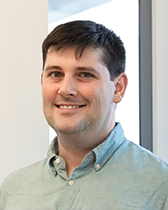James Fitzgerald
Associate Professor

- james.fitzgerald@northwestern.edu
- Website
- 847-491-5702
- Cook 2-137
Specializations
Regions(s): Brain and Behavior; Systems Neuroscience
Research interest(s): Theoretical neuroscience; Neural basis of behavior; Whole-brain sensorimotor processing; Learning and memory; Neural networks
Research Summary
“Science is built up of facts, as a house is with stones. But a collection of facts is no more a science than a heap of stones is a house.” Henri Poincaré
The brain’s fine-scale structure is naturally described in the language of physics, biochemistry, and cellular biology, whereas its large-scale structure is more easily framed by concepts from psychology, machine learning, and artificial intelligence. This is a very exciting time for neuroscience because experimenters are increasingly able to measure circuit-level phenomena that are poised to bridge the gap between low-level and high-level descriptions of the brain. Coordinated theoretical progress is needed to transform these data into hypotheses, theories, and principles of brain function.
Our research combines first-principles theory, phenomenological modeling, data analysis, and experimental design to build theoretical frameworks and data-driven models that advance the frontiers of neuroscience. We seek a multiscale understanding of the brain and ask questions that link across scales. We also seek general principles, which should illuminate the details of specific systems and direct broad thinking about the brain. Our integrative goals lead us to work on a wide variety of neuroscience problems, brain systems, and animal models. These efforts are closely coordinated with experimental work from collaborators around the world.
Selected Publications
- Rajagopalan AE, Darshan R, Hibbard KL, Fitzgerald JE, Turner GC (2023) Reward expectations direct learning and drive operant matching in Drosophila. Proc Natl Acad Sci USA 120(39):e2221415120. https://www.pnas.org/doi/abs/10.1073/pnas.2221415120
- Sun W, Advani M, Spruston N, Saxe A#, Fitzgerald JE# (2023) Organizing memories for generalization in complementary learning systems. Nat Neurosci 26:1438-1448. https://www.nature.com/articles/s41593-023-01382-9
- Biswas T, Fitzgerald JE (2022) Geometric framework to predict structure from function in neural networks. Phys Rev Res 4:023255. https://journals.aps.org/prresearch/abstract/10.1103/PhysRevResearch.4.023255
- Biswas T, Bishop WE, Fitzgerald JE (2020) Theoretical principles for illuminating sensorimotor processing with brain-wide neuronal recordings. Curr Opin Neurobiol 65:138-145. https://www.sciencedirect.com/science/article/pii/S0959438820301665
- Yildizoglu T, Riegler C, Fitzgerald JE#, Portugues R# (2020) A neural representation of naturalistic motion-guided behavior in the zebrafish brain. Curr Biol 30(12):2321-2333.e6. https://www.sciencedirect.com/science/article/pii/S0960982220305571
- Chen J, Mandel HB, Fitzgerald JE#, Clark DA# (2019) Asymmetric ON-OFF processing of visual motion cancels variability induced by the structure of natural scenes. eLife 8:e47579. https://elifesciences.org/articles/47579
- Naumann EA, Fitzgerald JE, Dunn TW, Rihel J, Sompolinsky H, Engert F (2016) From whole-brain data to functional circuit models: the zebrafish optomotor response. Cell 167:947-960. https://www.cell.com/fulltext/S0092-8674(16)31402-7
- Fitzgerald JE, Clark DA (2015) Nonlinear circuits for naturalistic visual motion estimation. eLife 4:e09123. https://elifesciences.org/articles/9123
- Attardo A*, Fitzgerald JE*, Schnitzer MJ (2015) Impermanence of dendritic spines in live adult CA1 hippocampus. Nature 523(7562):592-596. https://www.nature.com/articles/nature14467
- Fitzgerald JE*, Lu J*, Schnitzer MJ (2012) Estimation theoretic measure of resolution for stochastic localization microscopy. Phys Rev Lett 109(4):048102. https://journals.aps.org/prl/abstract/10.1103/PhysRevLett.109.048102
Selected Honors/Awards
- 2017-2023 Janelia Group Leader. Howard Hughes Medical Institute.
- 2013-2015 Swartz Fellowship. Harvard Center for Brain Science.
- 2011-2013 NSF IGERT Trainee. Stanford Center for Mind, Brain, and Computation.
- 2008-2011 NSF Graduate Research Fellowship. National Science Foundation.
- 2006-2007 Beckman Scholar. The Arnold and Mabel Beckman Foundation.
